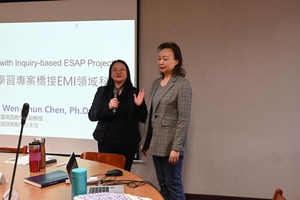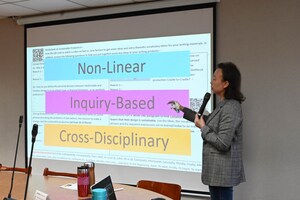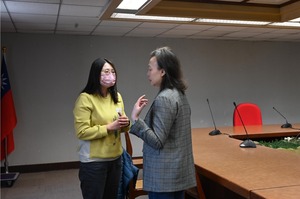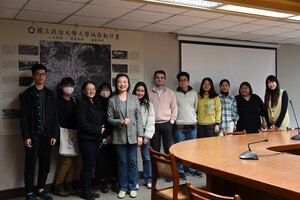






【Article by EMI Resource Center 】
#EMI Teaching Sharing #EAP Teaching
On Thursday, March 20, 2025, the NCCU EMI Resource Center hosted a teaching sharing session on "Inquiry-Based Learning" with the topic "Bridging EMI with Inquiry-based ESAP Project." The event featured Associate Professor Wen-Chun Chen, Director of the Language Center and Associate Professor of the Department of Foreign Languages and Literature at National Chung Cheng University, as the keynote speaker. She shared insights on designing first-year Academic English (EAP) courses to effectively transition students into university-level learning under the reformed 108 Curriculum. The event attracted enthusiastic participation from faculty and students across various departments.
The session was opened by Professor Siaw-Fong Chung, Director of the NCCU EMI Resource Center. Prof. Chung said that Associate Professor Wen-Chun Chen is a distinguished expert in English language teaching and research, and has received multiple accolades, including the Ministry of Education’s Teaching Practice Research Excellence Award, the Teaching Excellence Award, and the Outstanding Young Scholar Award. Then, Assoc. Prof. Chen began by introducing the concept of "Inquiry-Based Learning (IBL) with a Focus on Language and Content" and explained how this approach can be applied to interdisciplinary English writing course design.
Assoc. Prof. Chen initiated the discussion with a thought-provoking question: "Are students under the 108 Curriculum a ‘new species’?" This resonated with educators in attendance, leading to an in-depth discussion on the challenges and opportunities brought about by the curriculum reform in university-level English instruction. The speaker emphasized the need to transform traditional English writing instruction by adopting a course design framework that follows a "Divergence to Convergence" approach. The speaker proposed that Academic English courses should integrate elements such as communication, visualization, journalism, debate, professional academic writing, technology and tools, and political science to enhance interdisciplinary learning and critical thinking skills.
Assoc. Prof. Chen stressed that students under the 108 Curriculum require project-driven teaching models that encourage them to explore social issues, enhance their motivation, and focus on the learning process rather than merely achieving standardized answers. Furthermore, with the increasing shift towards non-linear learning, teachers' adaptability plays a crucial role in classroom effectiveness. The speaker recommended that first-year EAP courses begin with productive learning activities to assess students' prior knowledge, allowing instructors to tailor content accordingly.
In course design, Assoc. Prof. Chen used the United Nations Sustainable Development Goals (SDGs) as an example, demonstrating how worksheets, discussion activities, and student assignments can be effectively incorporated into the classroom. The speaker emphasized the importance of using authentic materials, even if they were not traditionally included in textbooks, as this approach not only strengthens students' language proficiency but also fosters their awareness and critical thinking regarding global issues.
Assoc. Prof. Chen also addressed the challenges associated with inquiry-based learning, such as the significant preparation time required for instructors, students' lack of confidence in English expression, and the impact of language limitations on learning outcomes. The speaker suggested that teachers gradually introduce inquiry-based learning to reduce the burden of lesson preparation. Additionally, creating a supportive English learning environment can help students become more comfortable expressing themselves. Through multiple drafts and revisions, students can systematically build their confidence and improve their writing skills.
During the Q&A session, a participant raised a question regarding the use of Artificial Intelligence (AI) Assisted Writing Tools, such as ChatGPT, for academic writing. In response, Assoc. Prof. Chen noted that instructors could engage in discussions with students to verify their learning process and help them understand the potential consequences of relying on AI-generated content.
The lecture received highly positive feedback, with attendees expressing strong support for interdisciplinary collaborative teaching models and structured instructional frameworks. Assoc. Prof. Chen concluded by stating her commitment to further refining her teaching methods to develop more effective EAP course designs. The NCCU EMI Resource Center remains dedicated to advancing language teaching and research and will continue to organize similar academic events to promote interdisciplinary academic exchange and collaboration.
Website:https://www.eminccu.com/
Facebook:https://www.facebook.com/nccu.emi
Instagram:https://www.instagram.com/nccu.emi